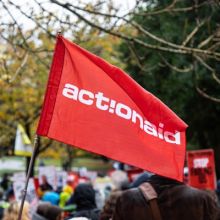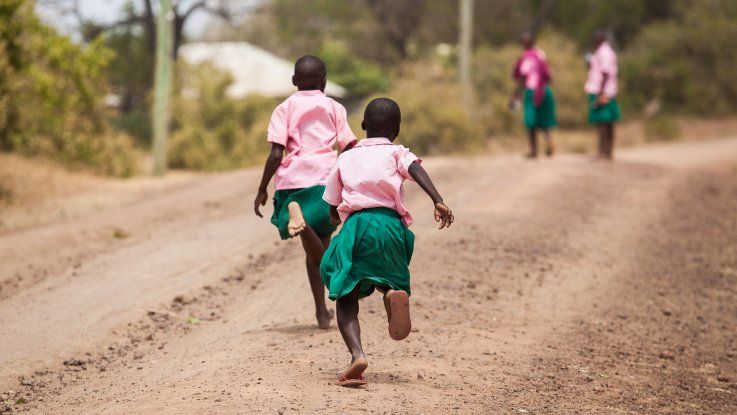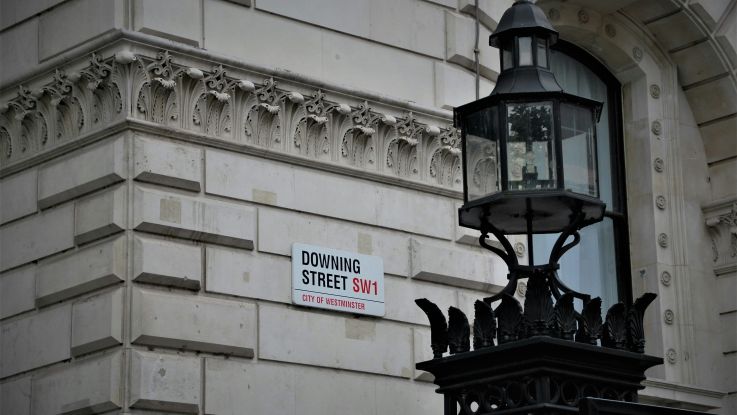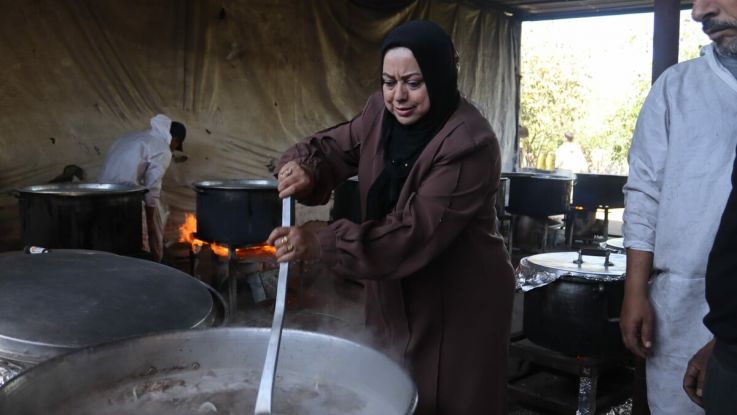#MeToo: Four reflections five years on
14 October 2022
Five years on from the rise of #MeToo, four ActionAid UK Community Campaigners share their reflections on how the movement changed things and where it's headed next.

Women campaigning for street lights in Sao Paulo, Brazil, to make the cities' streets safer for women. Photo: ActionAid
After former film producer Harvey Weinstein was exposed for 39 allegations of rape and sexual harassment, on October 15, 2017, actor Alyssa Milano asked women everywhere to share their own experiences of sexual harassment or abuse by replying to her tweet with ‘Me Too’. Overnight #MeToo went viral.
But eleven years earlier, Black activist and survivor of violence Tarana Burke created ‘Me Too’ as a slogan to encourage women of colour in her community to speak out against sexual abuse and harassment.
As ActionAid campaigners we know that women and girls experience violence and discrimination in every society, simply because of their gender.
ActionAid works across the world to campaign against poverty and to fight inequality so every woman and girl can live a life free from violence. In response to this ongoing work, we take a moment to reflect on the impact and limitations of #MeToo movement on its five year anniversary and what comes next.
From the USA to Malawi: The reach of #MeToo
Have you heard of Maureen Phiri?
Maureen initiated the Ndiulula campaign which aims to break the silence on workplace sexual violence in Malawi.
Non-reporting of gender-based violence incidents at work is rampant but this has not stopped Maureen from telling her story as a survivor. Back in 2018, Maureen and others in the Young Urban Women’s Movement conceptualised and implemented their own version of #MeToo after attending an ActionAid Malawi workshop on decent work. The discussions at this forum gave birth to this campaign.
Using #Ndiulula and #IWontBeSilent many were empowered to report on their own experiences of workplace violence thereby strengthening the collective voice. The campaign has received financial support from the Malawian government and Malawi Congress of Trade Unions.
That the #MeToo movement has inspired campaigners outside the USA to take action in their communities is indicative of its widespread success. As we approach five years of #MeToo, I hope the seeds have been sown for many more girls and women to follow in Maureen’s footsteps. After all, global problems require a coordinated global response.
Feima Sannoh, ActionAid Community Campaigner, London.
Access to internet and access to rights
In 2017 #MeToo, the hashtag was propelled worldwide. But what do we mean by worldwide?
In China, #MeToo could not exist for long. It instead became #RiceBunny. A translation of what the phrase “Me Too” sounds like in Mandarin, but more importantly a clever attempt at getting around censorship.
When we talk about #MeToo, it is easy to get carried away and only consider the social media impact. It is easy to remember the tweets, harder to remember the silent protests from corners of the world not illuminated by Twitter or Instagram, and voices of people without internet access. It is harder to consider how movements might not always manifest themselves in ways that we are used to, especially outside the global north. Yet each form is still worthy of acknowledgement.
Mishita Khurana, ActionAid Community Campaigner, Edinburgh
#NotAllMen
We’ve all witnessed someone roll their eyes and declare that 'you can’t say or do anything since #MeToo.'
The movement has undoubtedly given voice to women who didn’t understand something that had happened to them, let alone that others had experienced the same thing.
The phrase #MeToo isn’t an accident, it highlights that there is strength and solidarity in numbers. And that puts the status quo in jeopardy. Even those that haven’t committed an offence are left feeling uncomfortable because the topic is nuanced and hard to distill into a quippy slogan. From that comes backlash.
It goes without saying that not all men are predators, in fact plenty are not. And there are some who grasp the topic enough to lead by example. We live in a world where a white man’s voice holds the most power so the next step to consider is how to amplify these voices to get the rest on side.
Charlotte Chibani-Jones, ActionAid Community Campaigner, London
An intersectional approach
No one can deny the incredible impact of #MeToo. In the past five years, we’ve seen CEOs ousted1 , public figures disgraced2 , and workplace policies reformed3 . Yet the picture remains bleak. According to a recent study4 , only 1% of rapes recorded by police in 2021 resulted in a charge that same year. A similar pattern is visible in legal systems across the globe, becoming significantly worse in the countries where women are most marginalised.
A common critique of #MeToo is that the movement is too selective in the voices it amplifies. Just as class, race, and socio-economic status make it harder for survivors of sexual assault to receive legal justice, these factors also dictate whose stories we hear online. It’s time to stop amplifying the loudest voices and focus instead on campaigning for changes that would be beneficial for all survivors - significant and lasting legal reform.
Lucia Messent, ActionAid Community Campaigner, Nottingham
Would you like to get involved?
ActionAid UK’s Community Campaigners, are supporters who volunteer some of their spare time to engage with our work on a deeper level. This opinion piece is a part of our campaigning activities, and we encourage others to join our network to build solidarity within a global movement.
You could attend online or in-person events, training and meetings, and help shape our campaigning activity. Join our global movement fighting for change with women and girls by signing up here or emailing us at campaign@actionaid.org to find out more.
Footnotes
- 1https://www.refinery29.com/en-us/2018/07/205700/les-moonves-cbs-sexual-misconduct-allegations-ronan-farrow
- 2https://www.refinery29.com/en-us/2017/10/175435/celebrities-accused-of-sexual-assault-harassment-weinstein-cosby-lauer
- 3https://www.vox.com/identities/2019/10/4/20852639/me-too-movement-sexual-harassment-law-2019
- 4https://rapecrisis.org.uk/get-informed/statistics-sexual-violence/



